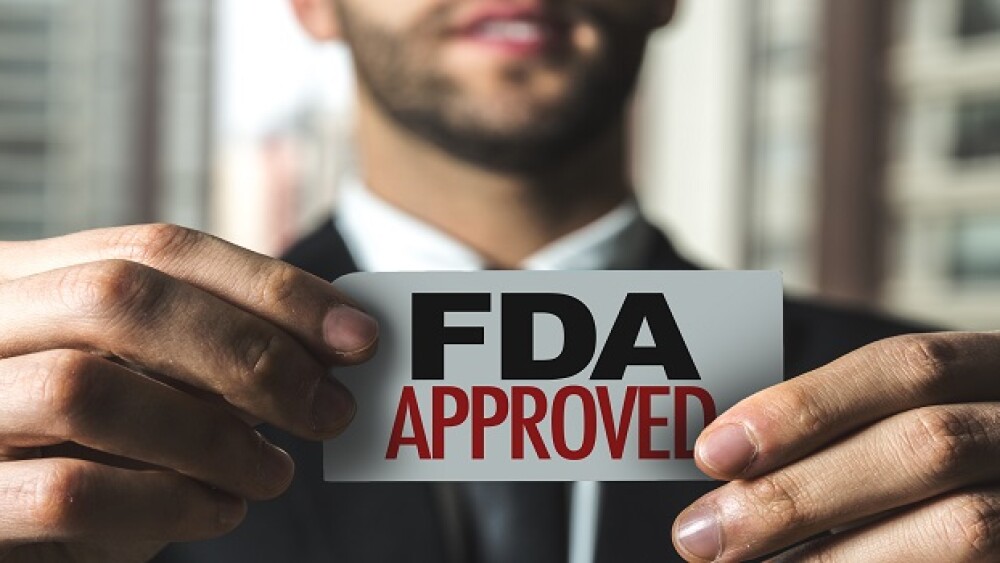The FDA approved Sanofi and Regeneron’s Dupixent (dupilumab) as an add-on maintenance therapy for patients with moderate-to-severe asthma. The approved group is age 12 years and older with either an eosinophilic phenotype or with an oral corticosteroid-dependent asthma.
The U.S. Food and Drug Administration (FDA) approved Sanofi and Regeneron Pharmaceuticals’ Dupixent (dupilumab) as an add-on maintenance therapy for patients with moderate-to-severe asthma. The approved group is age 12 years and older with either an eosinophilic phenotype or with an oral corticosteroid-dependent asthma.
“In the asthma clinical trial program, Dupixent reduced severe exacerbations and oral corticosteroid use, improved quality of life and showed statistically significant and clinically meaningful improvements in lung function,” said George D. Yancopoulos, Regeneron’s president and chief scientific officer, in a statement. “Following the approvals in atopic dermatitis and asthma, and recently announced positive Phase III results in chronic rhinosinusitis with nasal polyps, we are committed to advancing our broad development program in additional Type 2 inflammatory diseases.”
Dupixent’s mechanism of action is to inhibit the overactive signaling of interleukin-4 (IL-4) and interleukin-13 (IL-13). These are two key proteins that contribute to Type 2 inflammation, which is linked to moderate-to-severe asthma. Inhibiting the signaling was associated with decreases of inflammatory biomarkers including fractional exhaled nitric oxide (FeNO), immunoglobulin E (IgE) and eotaxin-3 (CCL26).
The approval was built on a pivotal trial program that looked at 2,888 adults and adolescents with moderate-to-severe asthma in three randomized, placebo-controlled, multicenter clinical trials for six months to one year. The trials did not eliminate patients on the basis of baseline eosinophil levels.
The largest trial was Trial 2, where the drug reduced exacerbations and improved lung function in the overall population. In patients with eosinophil counts greater than or equal to 150 cells/microliter, which represented 70 percent of patients enrolled, improvements in exacerbations were observed. Efficacy improved in patients that had higher eosinophil counts.
Dupixent comes in a pre-filled syringe intended for subcutaneous injection. It is already approved in the U.S. for adults with moderate-to-severe atopic dermatitis whose disease is not controlled with topical prescription therapies. For asthma, it would be given every other week at different injection sites after an initial loading dose.
The drug is under review for moderate-to-severe asthma in several countries, including Japan and the European Union (EU).
“Today’s approval marks a significant development for certain people with moderate-to-severe asthma aged 12 years and older,” said Olivier Brandicourt, Sanofi’s chief executive officer, in a statement. “For patients dependent on oral corticosteroids, Dupixent improved lung function, reduced oral corticosteroid use and reduced exacerbations regardless of baseline eosinophil levels. Despite the spectrum of treatments for asthma, there continues to be an unmet need for so many patients with moderate-to-severe asthma, and given that Dupixent works differently than other biologics, there is now a new treatment option for these patients.”
There are some doubts about Dupixent pricing. In an April report by the U.K.’s National Institute for Health and Care Excellence (NICE), the organization noted that Dupixent had a price of about $1,800 (U.S.) for a pair of syringes that each carried 2 ml of the drug. At least in terms of treatment for atopic dermatitis, the government organization was skeptical if the treatment warranted the price.
“The committee agreed that dupilumab is innovative and a step change in managing atopic dermatitis, and acknowledged the stigma that can be associated with the condition,” NICE wrote in a draft guidance published April 3. “However, it did not hear that there were any additional gains in health-related quality of life over those already included in the [quality-adjusted life year] calculations.”
In 2017, Sanofi recorded net sales of $237 million for the drug and Regeneron recorded $245 million. Most sales were in the U.S. Consensus analysts’ peak sales projections are $3 billion.
The companies appear sensitive to the pricing criticism, noting that the wholesale acquisition cost of the drug remains unchanged and is the same for both asthma doses. They have also developed the Dupixent MyWay program to help provide access to the drug.





